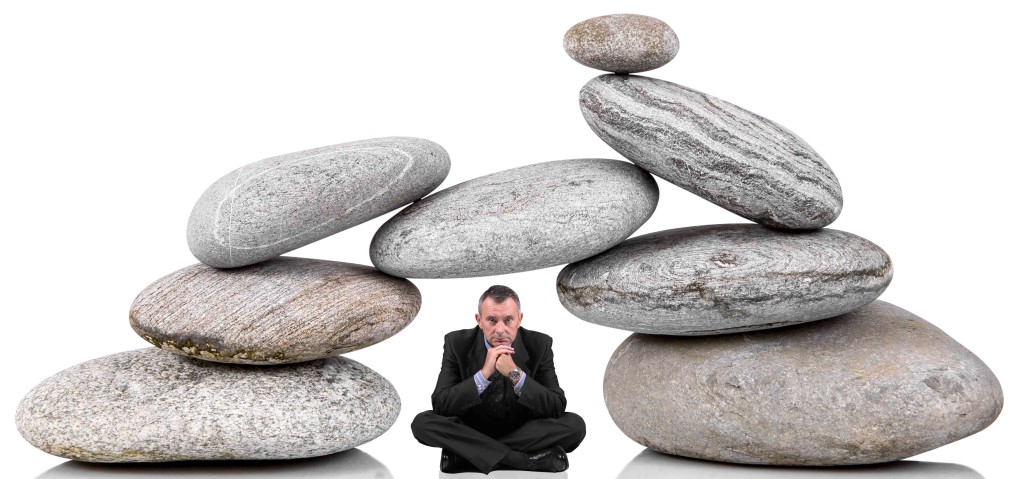I have a dream … and I walked away from it!

Many years ago, when I first started working in the space of identifying and moving beyond the imposter syndrome, I was part of a business support group. We came from different backgrounds and often gave each other a perspective we hadn’t thought of. Highly intelligent and creative people. I respected them enormously. Purpose and motivation have been part of my life for more than 20 years. It has always been important for me to get the big WHY of what I’m doing so I could get beyond the paralysis that can accompany serious self-doubt. From that perspective, I wrote down why I was working in this space because – to be honest – it was tough going. I was frustrated that I wasn’t getting traction inside businesses or even with individuals at that time. I wanted to remind myself why I was taking this difficult path. I shared my dream with my buddies in the business support group and received an underwhelming response. At the time, I took it as indicating I was totally off base and felt rejected. I pulled back, put my dream aside. While I continued to work in the space of helping others through the imposter syndrome, I did so from my head, wary of rejection, and not from my heart. Guess what! My business shrivelled. I put it down to being ahead of the curve. In my communication, I built a bridge from where they were to where I thought they could flourish. Instead of standing up and expressing myself honestly, I was being logical and a tad cowardly for not being true to myself. My presentations and workshops were solid though less inspiring than they could have been had I allowed my own Purpose to come through to create a bigger shift. I forgot about my dream. Until today when I found it in a pile of papers I had tucked away. I’m now ready to own it. “I have a dream … All my life, I have seen people – including me – settling for less, giving away our power, feeling shame that we aren’t good enough, hiding who we truly are from ourselves and others and living in emotional poverty. We keep ourselves separate so we don’t reveal our hollowness. We push away honest and supportive feedback that might provide us with the key to move forward. We judge and criticise others to keep them from doing that to us. We carefully craft masks to present a more acceptable and lovable version of ourselves to the world. We hide in the hope that no-one will notice us, yet paradoxically, we crave that someone will see and care for us as we really are, We have lost sight of our own truth. We feel hollow and unfulfilled. So, in the immortal words of Martin Luther King … and standing on the shoulders of that inspiring giant … I have a dream. I have a dream that each one of us will find the courage to peel back the masks and reveal what is beneath. I have a dream that we will accept ourselves in all our glory and imperfection. I have a dream that we will understand our own power to create the world we choose to experience ourselves in. I have a dream that we will reach out to each other with love, respect and support, recognising that we are one. I have a dream that we can create workplaces with heart and soul, which allow and encourage us to flourish as human beings. In doing so, we can create sustainable businesses. I have a dream that we will reach down and help others up to where we stand, knowing that we can’t do it alone. I have a dream that we can create relationships of true intimacy, love and trust and that we will bring our children up with respect, teaching them to treat others the same way. I have a dream that we will live from love, not fear. Each one of us has a value beyond our reckoning. And I believe it is time for us to claim it in order to make our contribution and to experience the joy of truly being of service to ourselves, to our community, to humanity.” I walked away from my dream because others – my support group and the market – didn’t validate it. Really, though, it was because I wasn’t ready to own it. While there are commercial realities involved in running a sustainable business – such as making a profit – it is not the reason to be in business. Rather, higher levels of profit come when we focus on the service we can provide to others; from Purpose. Purpose provides us with a way to grow, to learn, to give, to love, to live and to make the difference unique to each of us. Paraphrasing the words of that very wise woman, Eleanor Roosevelt, When you cease to make a contribution, you begin to die. I don’t know about you. I believe life is too short to resign before the adventure is over.
Is it time for you to stop hiding and REALLY show up?

Is it time for you to stop hiding and REALLY show up? A few years ago, my husband at the time stood in his underwear in front of a full-length mirror in our townhouse. He took in his image slowly with a smile on his face. Finally, he announced “Looking good!” and after admiring himself for a little longer, walked away to finish getting dressed. I picked my chin up off the floor. He had certainly been a very handsome man in his youth and had aged into a good looking older man. As happens to all of us at some stage, though, time had taken its toll. His hair had thinned on top and sprouted elsewhere. His arms and legs weren’t as muscular as they had been. The six-pack was long gone and his midriff had expanded considerably. I was about to say something to him about needing a pair of glasses when it occurred to me that I was the one needing the glasses. He was looking at himself and seeing what was great while I was looking at him and noticing what was falling short. How often do we look at ourselves with the same critical eyes that I used when looking at my (now ex-) husband? How often do we see what’s missing physically rather than looking at the good bone structure that has stood the test of time, or the lovely eyes, smile or some other beautiful feature – we all have at least one. And more importantly, looking below the surface, how often do we criticise ourselves for not being good enough rather than focus on the wonderful qualities that make us who we are. Each one of us is amazing. We have possibilities beyond our imagining. The only limitation is the way we see ourselves and the benchmark we judge ourselves against. We often compare ourselves in our darkest and most insecure moments to the way others present themselves – putting their best foot forward as my mum used to say. The challenge is that when we see what’s missing or simply wrong about us, we hide and in doing so, we cut off our opportunity to make the unique contribution each of us is capable of, simply by showing up as we truly are. How can we move beyond that loud-mouthed critic that sits inside our head? Here are a few thought starters: Identify the qualities and capabilities we bring to what we do. If you find that difficult – and most of my clients do – ask someone else to tell you how they see you in that context. It has to be someone you trust or you may discount their feedback. Once you hear what they have to say, you don’t need to accept it as gospel truth. Just sit with it and see if their comments resonate. Find three positives for every negative thing you say about yourself to diffuse the impact of your inner critic. It will be a conscious act to start off with, then it will become second nature until the voice stops criticising you. Recognise that not one single person on this planet is perfect, regardless of how they show up. We all have a shadow side – that part of us we would rather remain out of sight. When we accept and take responsibility for those parts of us we ‘judge’ to be bad, we take away their strength to tip our world upside down. Others then experience us as grounded and complete rather than feeling they’re not getting the whole picture. Know that increasingly, people we work with and certainly customers want to see and interact with the real you, not some cardboard cut out of you. I’m not suggesting that it’s OK for you to lose your cool and treat others badly because that’s who you are. The truth is, that’s not who you are; not deep down. So find that person you may have buried behind the fear and let him or her out to play. In the immortal words of Oscar Wilde “Be yourself; everyone else is already taken.” Get in touch with your Why. What gets you out of bed and off to work in the morning? What legacy would you like to leave? What difference are you in a position to make? To figure out what your unique contribution can be, you need to claim your strengths, qualities, capabilities and successes. If you want 2017 to be a terrific year for you and those whose lives you touch, change your glasses and look for what is wonderful about you. It can feel challenging, granted. In the words of Marianne Williamson, “…Our deepest fear is that we are powerful beyond measure. It is our light, not our darkness that most frightens us.”. It’s time to shine because our willingness to shine gives others permission to do the same and we collectively lift the bar. May you shine brightly this year. If you’d would like to shine and contribute to lifting the bar, learn more about my free webclass.
7 ways to Strengthen Resilience

Yes, life is uncertain. There is very little that occurs to us on a day-to-day basis that we can control. Yet, we do our best to to reduce our feeling of vulnerability and restore some feeling of certainty. The truth is we can’t control much at all in our external environment. Life can be messy, chaotic and even unfair. We may be hit with health issues, redundancy, divorce, death of loved ones, being passed over for promotion, losing our financial security or conflict in our work environment. It’s easy to fall victim to what occurs. The only thing we control is oiur response to what comes at us. This is where resilience comes in. Resilience is the ability to bounce back after life’s inevitable setbacks. It’s the ability to put things into perspective without diminishing them. How do we develop and increase our emotional resilience? Here are a few of the principles that have worked for me and my clients, resulting in the ability to handle some of the tough challenges life throws at us: Find your Purpose. What is your reason for being? What gives your life meaning and fulfillment? What is the contribution you believe you can make in your life? It may come directly from the products or services you provide either direct to clients or to your employer. Perhaps there was something missing in your childhood that you are driven to rectify. Or maybe there is a clear notion of the legacy you want to leave and how you want to be remembered. Your Purpose will give you an emotional connection to something much larger than you.When life throws its inevitable curve balls at you, Purpose provides a bigger context for the threat. Barriers become challenges which can be overcome. Purpose provides the energy to move beyond the immediate setbacks allowing you to make your unique contribution. Develop a Positive Mindset. Not long ago, the widely-held view was that people were born optimists … or not. However, according to Shawn Achor set out in his presentation “The Happy Secret to Better Work”, optimism can be learned. It is a life-critical skill. 90% of our happiness is predicted not by our external world, but by the way your brain processes it. Only 25% of job success is predicted by IQ. 75% is predicted by our optimism levels, our social support and our ability to see stress as a challenge. Positive thinking is strongly linked with increased performance.Now, it is accepted that we can develop a positive mindset. We can increase our optimism by flipping situations to find the silver lining. When we practice gratitude each day, we basically rewire our brain. Just 3 different things that you appreciate each day for 28 days! Finally, making useful or productive mistakes contributes to a positive mindset. This technique is about letting go of blame and shame around making mistakes. Instead, we look at the mistake and ask “What can I learn from this so that I have a different outcome next time?” We take the lesson and let the mistake go. Practiced regularly, these three techniques will shift your mindset over time to one that is automatically more positive. Let go of Perfection. Many of us have been strongly influenced by perfectionist parents or caregivers. The ideal is what we aim for and nothing less will do. The problem is we can’t define the ideal. All we know is that we haven’t achieved it. When we expect our performance or our lives to be perfect, we are bound to be disappointed. The usual outcome is dissatisfaction and self-doubt which reinforce the feeling of not being good enough. It is hard to be resilient if we don’t believe in ourselves. Replace your inner critic with a Master Mind group. We all have an inner voice that provides commentary on the world around us. For many of us that voice is critical and winds up undermining us. We get ticked off for not doing the ‘right’ thing. We compare ourselves to others and either become arrogant or jealous as a result. We may give, give, give and then become resentful of being exploited, playing out the martyr.Believe it or not, this inner voice has our wellbeing in mind. It might be attempting to keep us safe from hurt, from being used, from failure and rejection. However, what it really does is undermine our possibilities by constantly sniping at us, wearing us down.How much more useful would it be to have an internal Master Mind group of all the people you respect and appreciate – alive or dead – whose voices could give you support and constructive advice. Their perspectives will help you open up possibilities. Make a list of all the people whose sage advice you would love to have access to. What would they say to you about whatever situation you’re currently experiencing. Make a habit of asking them each day (again that habit thing) and over time, you will internalise their voices. If you’ve had a great mentor or coach, you’ll know what I mean. After a while, you start hearing his or her voice in your head providing another perspective on the situation you’re currently experiencing. Try it.In addition to your internal Master Mind group, develop an external support group to provide a sounding board and objective advice when you need it. If they can also cheer you on where that’s valuable, even better. Separate your feelings from reality. We each have our personal unique view of the world. Our brain filters the 11 billion pieces of information we’re exposed to in each minute (no I have no idea how the neuroscientists arrived at that figure) down to 150 that we take in then down to 5-9 that we actively pay attention to. We eliminate most of what we see, hear and experience. How do we do that? What is the criteria we use? The answer is that our amazing mind has developed a filtering system based on
7 ways to move beyond ‘Nice Girl’ to Thought Leader

I was raised to be a nice girl, to be seen and not heard, to do what I was told to do and not what the adults in my life did. I was taught that if I couldn’t say something nice, I shouldn’t say anything at all. It was important that I didn’t offend anyone. As a result of all that conditioning, my tendency has been to avoid conflict or confrontation of any kind. Imagine my dilemma when I found out many years ago that to be of any real value as a thought leader (speaker, trainer, author …) I needed to challenge their thinking; to poke and stir up thoughts; to offer choice. Being agreeable maintains the status quo. It validates people where they are and takes away their growth opportunity. Almost as important, without being disruptive in my unique way, I can’t stand out from the crowd and it’s less likely I’ll be commercially successful. What a journey it’s been to shift from the nice agreeable girl to embrace my spikey. Yes, it was there buried beneath the patina of socially appropriate behaviour. What did it take for me to make that shift? Here are 7 steps in that journey that can help you do the same: 1. Believe we add value So many of us either don’t see our talents and capabilities or fail to recognise their value. Without claiming this critical part of ourselves, we can’t make our contribution. Without recognising our value, we feel we have nothing to offer that can add to another person’s perspective. I’ve used the word believe purposefully. When I first started out in my own business, I had beautiful marketing materials that I never used. I realised they were developed from other people’s feedback and I wasn’t buying it. I needed to recognise my strengths and successes, understand the benefits they provided to others and feel that it was OK to say I’m good at this. I needed to own and embody my value. I needed to believe in me before I could expect others to. Equally, I needed to let go of being a generalist. In the early days of a speaking or training career, many of us look at other people’s success and think “I can do that” and we incorporate that capability into our offering. That old saying “If we don’t stand for something, we fall for everything” comes to mind. We need to draw our line in the sand and tell the world (or at least the niche we’re after) that this is what we stand for; this is what we offer and we’re damned good at it! Then we are in a position to offer value. 2. Listen to – then transform – the critical voice inside We all have a critical voice. Some are less critical. Some are loud while others are a mere whisper. It’s there and it is providing a running commentary on how we’re doing according to our internal filters. If we believe we’re good enough, that we have a right to be here and have a valuable contribution to make, our internal voice will be reinforcing those positive messages. If we sometimes (or often) question our worthiness, the value we bring and what we deserve in this life, our critical internal voice will reflect those filters. Whatever way we think will influence how we show up. That critical voice is simply providing us with information on how we really think about ourselves and the world around us. Given those beliefs are deep-seated, our critical voice is helpful in surfacing those beliefs so we can challenge the value they bring in our current situations and in relation to our dreams. Do they support or undermine our best efforts? We can be grateful for the voice and the information it provides … then choose to do what we need to. This is where courage comes in. We can’t make our unique contribution – in this case add another perspective so our clients can make wiser choices – unless we move past that critical voice that would have us play small to keep us safe. 3. Ensure the message is clear Yes, receiving feedback can be challenging. Giving it can also be hard, particularly if you’ve grown up with a credo of not offending anyone. I used to get so frustrated when I found the courage to provide my opinion and then it wasn’t understood. I realised that the nice way I wrapped up what I was trying to say obscured the message. If I wanted to get my message across, I had to peel back the niceness to reveal its core. If your tendency is to wrap the feedback up to make it more palatable, ensure that you haven’t buried the nugget so deeply it gets lost. 4. Focus on intent This starts with a personal question. Why am I giving this person feedback? ‘Is it kind, is it necessary?’ is a phrase I was taught years ago. Am I providing the disruption to demonstrate just how clever I am or am I truly seeking to be of service to the other person. Where it’s the latter, the desire comes through as part of the communication. If not, my ego seeking validation will be heard instead and that can set up an icky energy. Feedback is a gift. We often can’t see what’s going on in front of our noses; feedback is essential to expose and resolve our blindspots which are often the parts of ourselves that stand in our way. As thought leaders, we can be the light. So, to the second question: ‘Will it help the other person to hear what I could share? Is what I’m about to say the next natural step for that person for him/her to progress?’ Articulating the disruption, communication, feedback, seeking to resolve a conflict or enforce a boundary, however, can be difficult. I got to the point where I realised my clumsy
The upside of being uncertain & uncomfortable

Human beings generally don’t like discomfort of any kind: physical, mental, emotional, spiritual. We stop exercising (if we even start) when we get tired or our muscles start to complain. We exhaust our ‘bandwidth’ when confronted with ideas that stretch our mind or learn new skills that feel overwhelming. In doing so, we may walk away in the midst of chaos, not realising that chaos is a prelude to a breakthrough. We may find emotions illogical and hard to control so we don’t let them out to begin with or we find other people’s emotions very confronting. Or when our spiritual practice brings up questions we can’t answer or philosophies that seem to be at odds with our own experience of the world, we may disconnect or walk away. Yet, discomfort is a state that we are designed neurologically to experience. It’s role in our evolution is to signal that it’s time for the next stage of our human development. However, most of us don’t interpret it that way. We see it as a signal that we’re not good enough. We’ve seen the images about the comfort zone that tell us magic happens outside it. We know, if we’ve allowed ourselves to experience it, the exhilaration of pushing through fear and redefining what we’re capable of. We know we need to ‘dare greatly’ to quote Brene Brown. It might sound simple … it certainly isn’t easy. I believed for years that I was up for any adventure in my life. I learned that was true … and I needed 3 days notice! I wanted to be ready for whatever was coming at me. That is a typical desire for someone who feels he/she needs to be hypervigilant to protect themselves. Uncertainty is a natural part of our lives. There is very little out there that we can control. All we can control is our response to it. Yet so many of us persist, albeit unconsciously, in seeking to control the actual situations that create a feeling of uncertainty within us. Let’s bring it closer to home. We can’t change the poor behaviour of others wherever it may occur. We can’t make our manager behave more respectfully, appreciate our qualities and contribution. We can’t make our clients recognise the value we bring. We can’t force others to see the world the way we do. We can’t even impose control over our internal uncertainty. We might think we succeed because we’ve distanced ourselves from the feeling of uncertainty through our behaviours. However, the cause is still there, lurking beneath the surface. 1. Engage in a retrospective: If you look back on your life – however short or long – you will see that you have experienced uncertainty many times before … and survived! Recognising this may well calm the fear associated with uncertainty. 2. See the positive: We can recognise that uncertainty means we’re in new territory and understand that means we have an opportunity to grow. In doing so, we can convert the fear associated with uncertainty into the excitement of a new journey. 3. Listen to the message: We can pay attention to the uncertainty and what lies beneath to provide us with the next chunk in our development – what we need to eliminate, transform or take on 4. Address the low self-esteem / Imposter Syndrome: While we can’t change the fact that we live with uncertainty, we can personally reduce the unnecessary uncertainty that comes from feeling we’re not good enough by addressing the distorted belief. 5. Reframe our discomfort into a larger context: We can convert the energy associated with the uncertainty into something more constructive such as fulfilling our purpose – our big why. Everything in our lives has a duality. When we look, we can see a positive and a limiting aspect to any situation. We can and do benefit from both. We can hold ourselves in limitation which may protect us from failure and/or other peoples’ judgements. Or we may become positively infatuated with any situation. Only by balancing both aspects can we neutralise our response to the situation and come to a place of acceptance.
